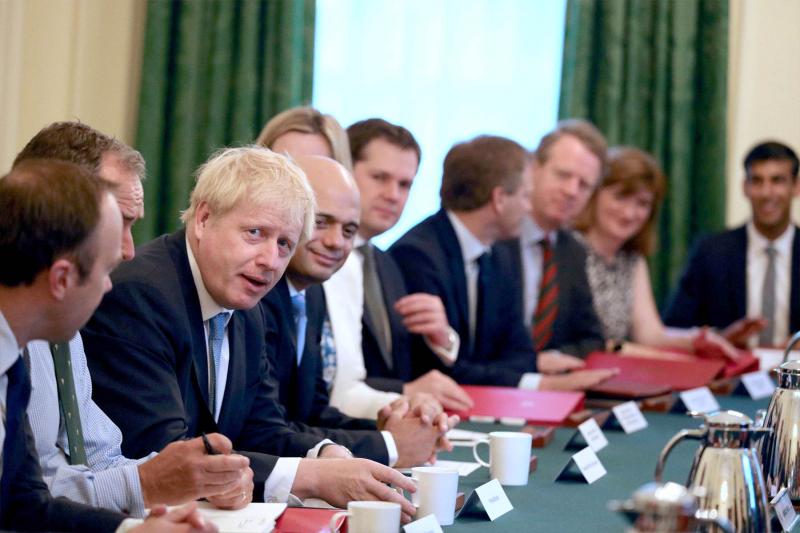What will Boris Johnson’s Britain do about Iran?

New policies. Prime Minister Boris Johnson holds his first Cabinet meeting at Downing Street in London, Britain, July 25. (Reuters)
Fears are running high in some quarters that Johnson would peel away from the European position and lead Britain into closer alignment with the United States.
When Boris Johnson took charge as Britain’s prime minister, the chatter among pundits and policy wonks was about Brexit. How would Johnson, the leading campaigner for Brexit ahead of the 2016 referendum, handle the United Kingdom’s planned departure from the European Union? Would he crash out without a trade deal or choose a less economically disruptive course?
Brexit, however, was not the most urgent challenge facing Prime Minister Johnson. On July 24, Johnson’s first day in office, the Brexit deadline of October 31 was 99 days away. It was the impasse with Iran that was Johnson’s most immediate problem.
A British flagged-tanker, Stena Impero, seized July 19 by Iran’s Islamic Revolutionary Guard Corps near the Strait of Hormuz, remained captive in the Iranian port of Bandar Abbas. Tehran released a steady stream of images and videos of the captured vessel before Johnson took office.
It was a humiliating dare, a gloating drumbeat that restated Iran’s seemingly dominant position with respect to that particular British tanker and others that might follow in its wake.
Johnson’s elevation to prime minister was greeted with a faux-cordial message from Iranian Foreign Minister Mohammad Javad Zarif. Even as he congratulated Johnson, Zarif warned that Iran would protect itself. “Iran does not seek confrontation,” Zarif posted on Twitter, “but we have 1,500 miles of [Arabian] Gulf coastline. These are our waters & we will protect them.”
What will you do about this incendiary mess, Tehran seemed to be asking London, all smirks and cocked snooks.
The message was much larger than the Stena Impero. It could justifiably be considered a coded reference to Iran’s escalating confrontation with the United States, even as US President Donald Trump tightens sanctions on Iranian oil sales in pursuit of a so-called maximum pressure campaign to force Tehran to the negotiating table.
At issue for the Trump administration is its stated desire for a new agreement with Iran. It would cover a vast and shifting American wish list that includes Iran’s embryonic nuclear programme, its missile defences, regional adventurism and even the fate of the theocratic regime.
Until Johnson became prime minister, Britain seemed fairly clear about where it stood on Trump’s economic and rhetorical war on Iran. London trod a nuanced position — neither slapping down Trump’s America nor forsaking the comfort of the more fraternal Franco-German position.
As signatories to the 2015 nuclear deal with Iran, France, Germany and Britain have been speaking with one voice to try to salvage the agreement, which is designed to discourage Iran from developing nuclear weapons. They tried to prop up Iran as best they could but their efforts have fallen short in material terms.
Accordingly, Iran has begun to marginally breach its nuclear commitments by increasing its levels of enriched uranium even as it seeks to intimidate the very European allies it desperately needs.
So, what will Johnson’s Britain do about Iran? Will it tack closer to the American position or stay aligned with the French and the Germans?
Fears are running high in some quarters that Johnson would peel away from the European position and lead Britain into closer alignment with the United States. That, however, may not be on the cards, at least for now, for two reasons.
First, there is the temporary stay offered by the meeting in Vienna between Iran and the European signatories to the nuclear deal. Johnson may want to wait for the outcome before he decides.
Second, Johnson may, like Trump, be blond, selfish, prone to untruths and astonishingly light on policy detail but there the similarity ends. Unlike the American president, Britain’s new prime minister is seemingly self-deprecating, an avid reader, a fine writer and as his former co-workers testify, sharp as a tack.
Accordingly, it’s reasonable to see Boris Johnson’s Britain treading a delicate middle path between Europe’s peaceable, independent approach and America’s escalatory policies on Iran.
Even though Johnson has rid himself of British Foreign Secretary Jeremy Hunt, who categorically stated the United Kingdom’s resistance to US “maximum pressure” tactics, there is every chance Britain will want to de-link seized ships from the nuclear crisis and pursue direct bilateral negotiation with Tehran.
Funnily, this could even allow Britain’s new prime minister to position himself as a bridge between the European Union and the United States.
It would be a post-Brexit statement of Britain’s relevance in advance of Brexit.
But there’s no predicting what Johnson might do.
Originally published in The Arab Weekly

